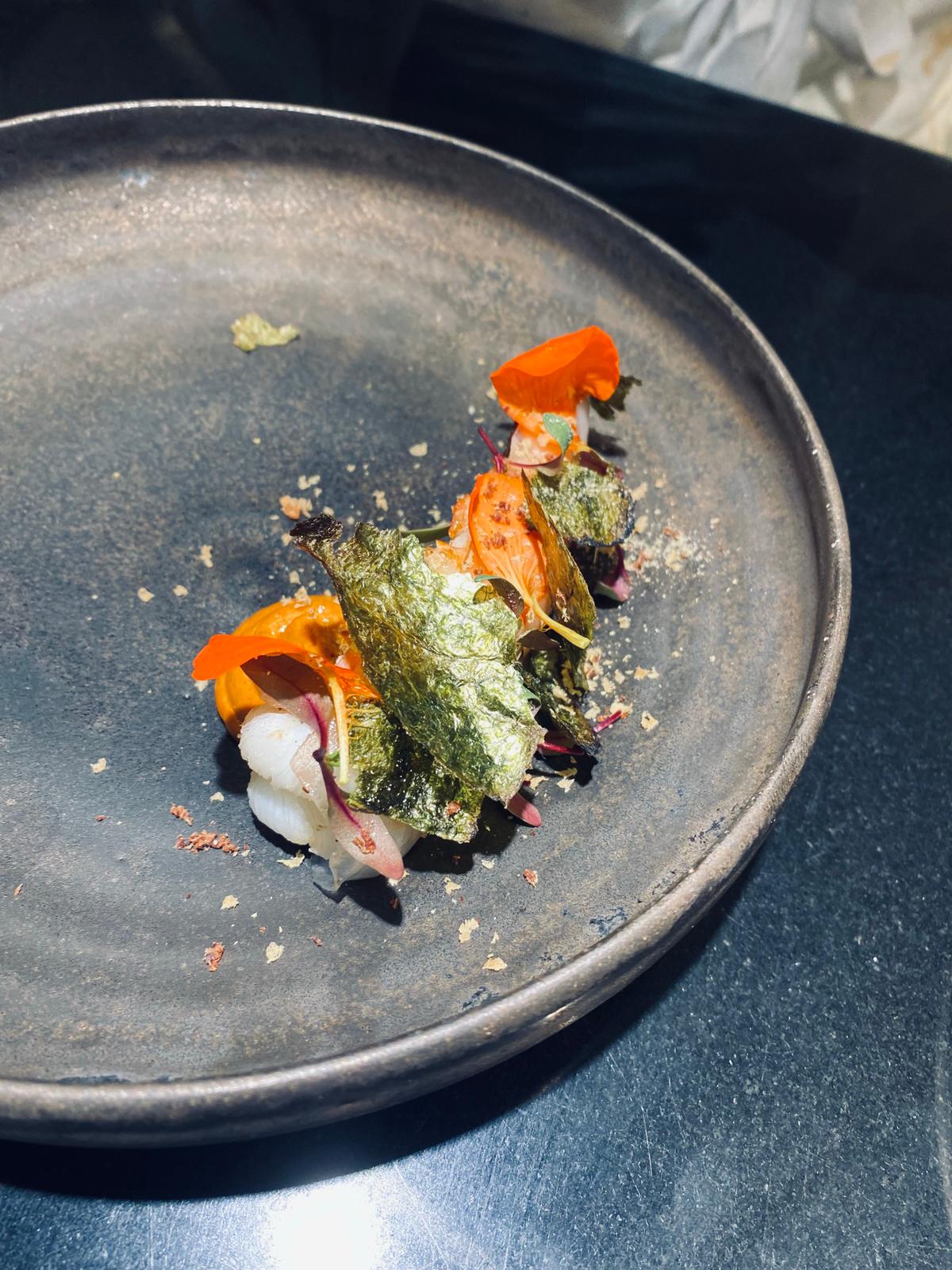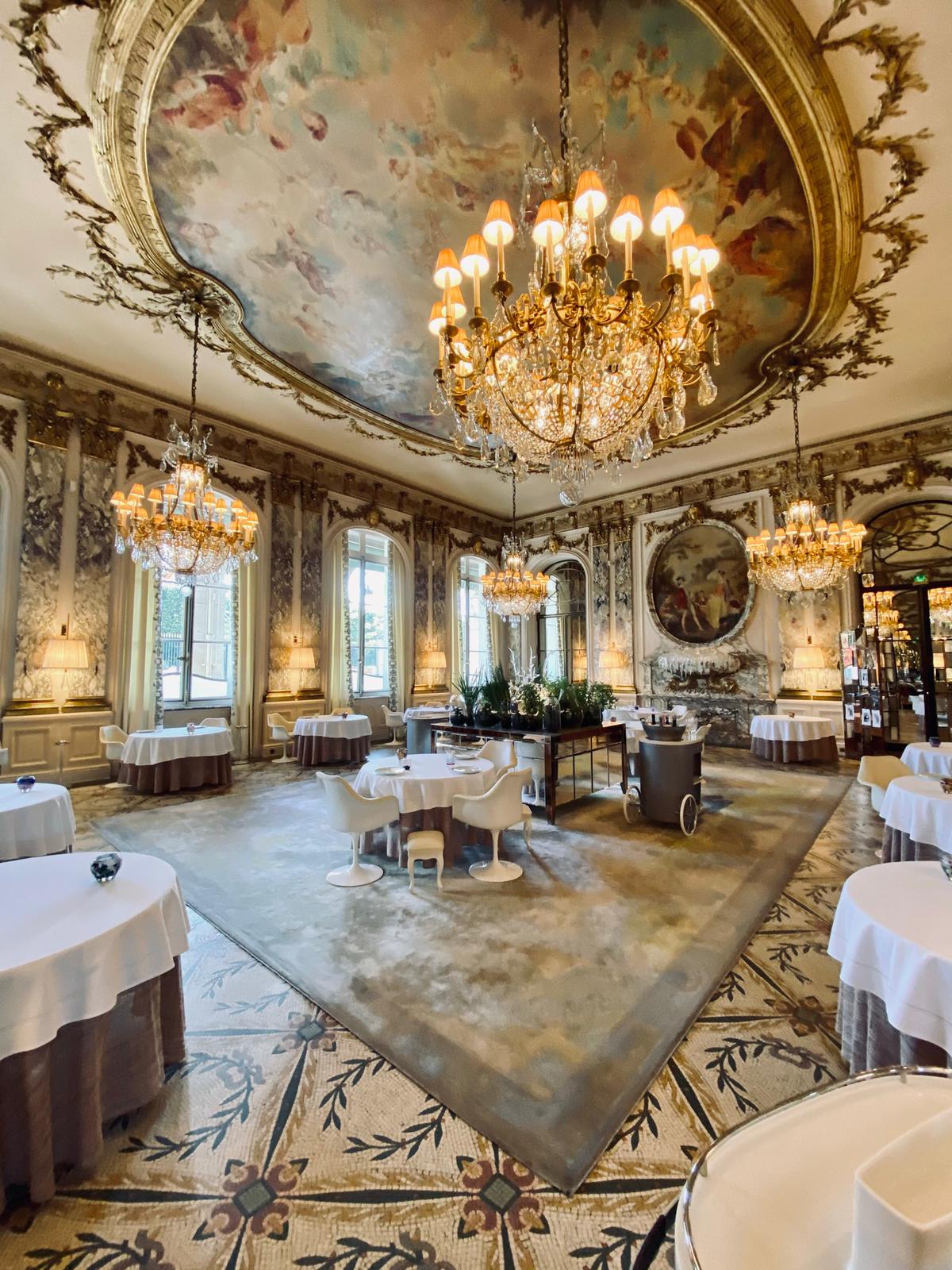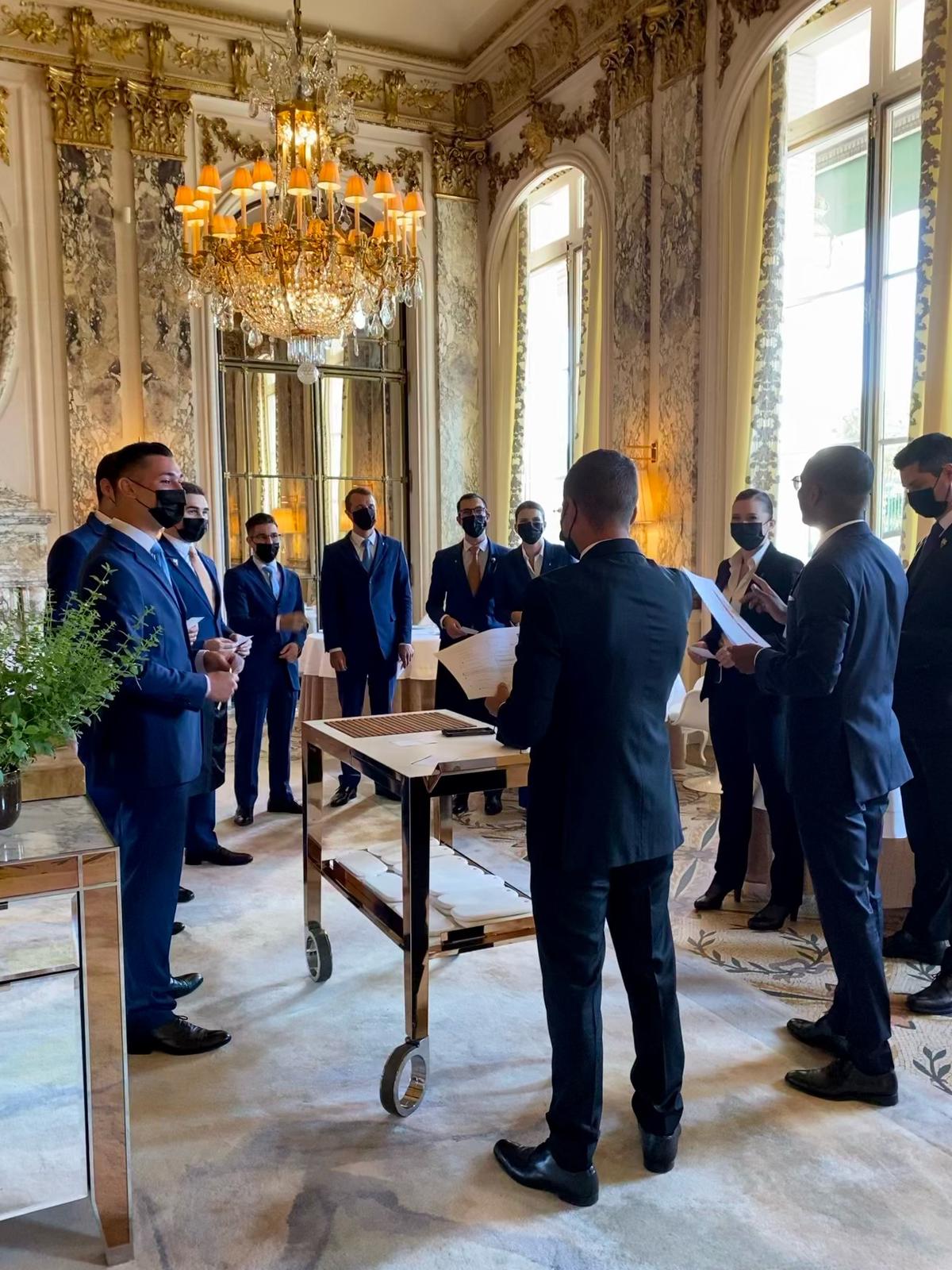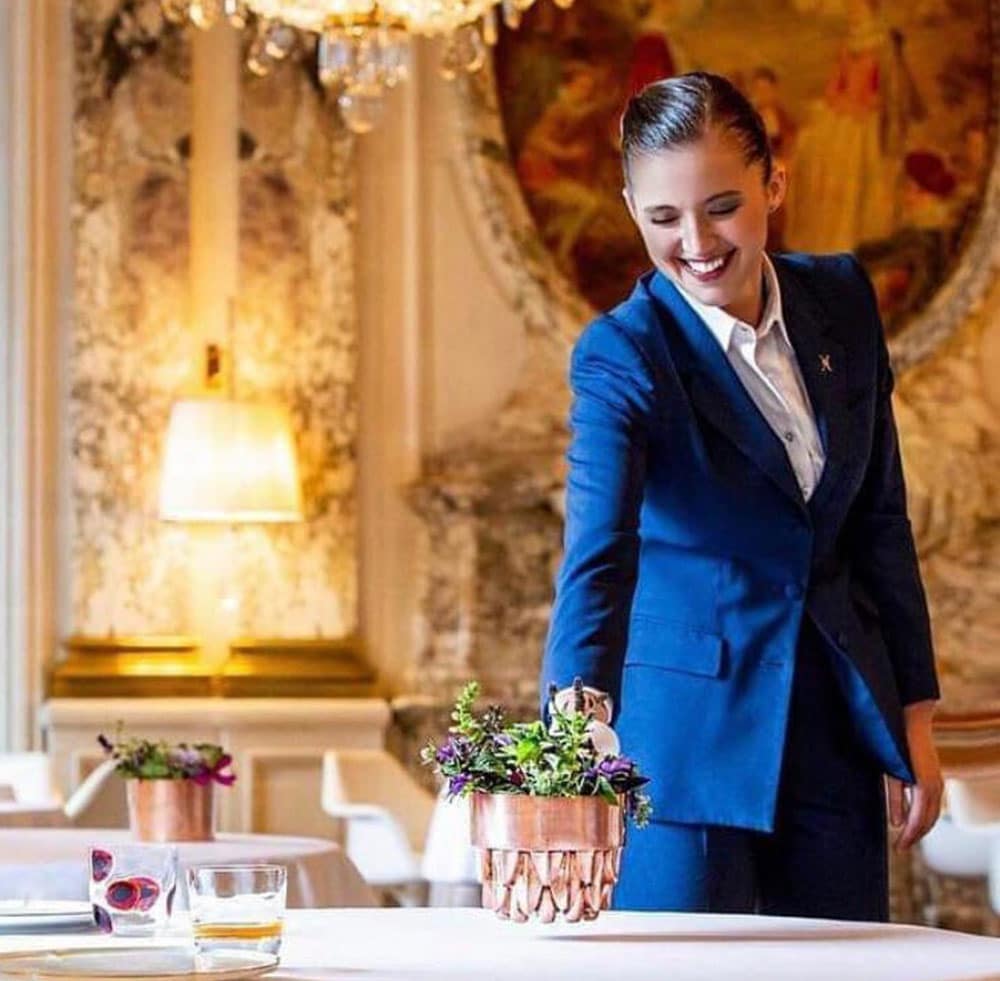Julie Bares-Bonneau
« Service is a bit like a play that is performed. As soon as we walk out of the kitchen, we have a role to play while remaining true to ourselves »
This is her first interview. She seems confident, standing behind her screen against a backdrop of golden mouldings, her hair slicked back, wearing a black suit and white shirt, her work uniform.
Her professionalism stands out. When, for instance, she uses restraint to talk about herself and her work. But she’s betrayed by her youth – she isn’t yet 30 years old – when, with a broad smile, she suddenly gives the most spontaneous and authentic answer.
Julie Bares-Bonneau is part of the new team at Le Meurice, built around Chef Amaury Bouhours, Restaurant Manager Olivier Bikao and Sommelier Gabriel Veissaire. A strong brigade assembled by Alain Ducasse who is known for his ability to identify talents and help them blossom. Julie is the youngest and (at the time of the interview) the only woman in this group of thirty-year-olds, but she’s also the team member who has worked at Le Meurice for longest, having joined directly after her studies at the Ferrandi School and climbing the internal ladder ever since. A faultless career and a style that perfectly embodies what service is and should be: professional and natural, considerate but not awkward, and ready to go against convention and tradition to ensure satisfaction of the guests.
How did your love for this profession come about?
To be honest, when I was younger, I wasn’t really interested in this trade, even though my family was also in the restaurant business. During the third year of my studies, I was a little late finding an internship, yet found myself joining the restaurant Rech. My experience there was a true revelation!
What Julie doesn’t mention at this stage of the interview – she will only reveal it later on – is that her father also works for the Alain Ducasse Group. A matter of discretion rather than a secret, as she believes she never needed any help to make her own way.
“Indeed, I was immersed in this environment, I knew the good sides as well as the drawbacks. But the human side, the open-mindedness, the diversity that I found at Rech truly made a strong impression on me. I don’t know exactly when it all clicked, but those ten days sparked a vocation in me. And because I didn’t really like school anymore, I joined Ferrandi directly.
I earned my CAP (vocational qualification) thinking I’d stop there, but my teachers pushed me to continue with a baccalaureate (A levels), and then a BTS (Higher National Diploma). All in all, I spent 6 years there, and as they say, I became part of the furniture!
Parcours de Julie Bares-Bonneau :
- 2009: enters the Ferrandi School in Paris at the age of 15
- 2011: earns her CAP (vocational qualification) in restaurant service
- 2013: earns her vocational baccalaureate (vocational A levels) in Restaurant Marketing and Service
- 2015: completes her BTS (Higher National Diploma) in Hotel and Restaurant Management with a culinary, table and service art option
- August 2015: joins Le Meurice Paris as headwaiter
- January 2018: becomes assistant maître d’hôtel
- October 2019: appointed assistant restaurant manager

What did you take away from all these years of study?
We were undeniably well trained, but unfortunately also a little formatted. We were taught the basics, but in the field, you realise that each restaurant is different. I knew a lot about service in theory, but the most confusing aspect for me was the relationship with guests. As a woman, some behaviours are more difficult to manage than others. Still a very rare occurrence. Then, it all depends on one’s personality. Being very shy myself, it was tough at first to join a brigade. But now, between Julie at work and Julie on the outside, it’s like two rooms with two different atmospheres! Off-work Julie is still shy and doesn’t open up, she can sometimes seem closed-off and cold. Whereas the Julie at work may seem stern with the uniform on, but she always gives her all, is very assured and not afraid to try bold things. I am quite persistent and when I have something in mind, I can be very stubborn… This is both good and bad, because it’s potentially a problem for service!
How do you let your personality shine through?
Service is a bit like a play that is performed according to the sequences imagined by the chef. As soon as we walk out of the kitchen, we have a role to play while remaining true to ourselves. I like to use a slightly childish image to illustrate this point: I compare myself to a Barbapapa, in the sense that I always adapt to my interlocutor while staying my genuine self.
With Olivier Bikao, our goal is to let people express their personality. We are not robots. It’s not about creating characters that are all the same, which would be impossible anyway, but rather playing with the strengths and weaknesses of each staff member to form a good team. In the restaurant, we have taken away many preparation aspects – such as meat carving – to focus on sharing with guests and creating a powerful and genuine experience. This is our ambition at Le Meurice. The emotion we try to convey is difficult to explain, it’s like passion, you need it in you to be able to share it with others. And unfortunately, that is very difficult to teach.
Is everything possible in a gastronomic restaurant today?
I would say yes… although there are some limits… so I’ll say everything is possible within a specific framework. At first, I didn’t want to join a gastronomic restaurant because I wanted to break free of any restriction. It was a challenge I set myself after Ferrandi. Those were preconceived ideas because, in the end, we are a rather laid-back starred restaurant. We can laugh out loud and even take selfies with guests. We don’t do it every day of course, but what might have been odd a few years ago is now the norm. I remember once taking little girls with me behind the cheese trolley, they were delighted and so were their parents.
In 6 years, I have clearly grown a lot. I have gained confidence in myself, and my current job allows me to do more. And contrary to my initial idea, I’m really made to work in a starred establishment!
Is there any guideline for explaining the menu?
Oliver gives us a description of the menu, but it’s for the basics and the ingredients. Then each of us modulates their speech to best convey Amaury’s intention to the guests. We are all links in a chain, so to convey this message, each of us must put their emotions into it. My explanation of a dish will be a little different from that of a colleague because we don’t all feel the same way when we taste it. Personally, I’ve always had trouble with recitations at school. I used to learn them by heart and now I have no recollection of them whatsoever. But if you learn using your own words, your mnemonics… then it just works. So no, nothing is set in stone, but we do follow the thread of the culinary journey and the emotion of each dish.
What constitutes a successful service?
Whenever I see people’s eyes shine with delight and they thank me at the end. Even if the service was tough and chaotic. A service is successful when everyone has enjoyed themselves: me, the guests, as well as the teams in the dining room and back in the kitchen. In the current context, people need to be pampered more than ever. Guests are coming back to the restaurant not only for the gastronomic aspect, but also for the human experience. And our approach to service has evolved. If the dish is good but everything else isn’t up to par, if guests don’t fully understand the journey created by the chef, this may lead to disappointment. So a successful service is all about earning that “thank you”, but a really sincere thank you.
Those entering the trade don’t have many female role models to look up to yet. There is one, however, who guides Julie Bares-Bonneau’s steps. Her name is Claire Sonnet, restaurant manager of Le Louis XV Alain Ducasse in Monaco. Her career path is a true inspiration for Julie, so when her restaurant manager told her “You are just like her, you have a clear path ahead of you, go for it”, she felt exhilarated.
What is the place of women in your profession?
When I joined this establishment, there were many other women, but now I am the only one in a permanent position. In our trade, our presence is fortunately encouraged, but you don’t necessarily have to do more to find your place. When I was struggling figuring this out, Olivier put me in touch with Claire Sonnet for advice. She recommended that I be a little firmer, that I gain confidence and stand up for myself. In a team, talking to a woman is one thing, talking to a man is another. A man may find it more difficult to receive criticism or feedback from a woman. Communication between men is crude and can quickly lead to conflict, whereas a woman will be more sensitive. But this should not prevent her from being firm.


Should the idea of family life be put aside?
People have realised that this is a very hard job, with long hours and huge pressure… But if you take pleasure in it and do it with passion, these constraints can easily be forgotten. It’s true that family life can be complicated, but there are many establishments, like here, where the teams only come in the evening, and we have Saturdays and Sundays off.
Currently I choose to focus on my career without thinking about what’s next, and if one day I find myself in a more stable situation, then I’ll consider it!
Julie is quite honest about her ambition to contribute to earning back the third Michelin star the restaurant lost back in 2016. An ambition certainly shared by the whole waiting and kitchen staff who have been working under the watchful eye of Chef Alain Ducasse since September 2020.
How important is it to win back the third star?
I used to think about it a lot, and that’s why every year I would say to myself: stay. But this crisis brought a fresh perspective and I decided to stop focusing so much on it because that’s how we won’t get it in the end. No matter how much we want to, some things happen beyond our control. And to be completely honest, since the reopening, we have only talked about it once. We told ourselves that if we get it, then great, we will have worked for it, but that our priority must remain our guests above all else. We must think about the experience we provide, that’s our goal. Then we’ll see what happens. Two stars is already amazing, but if tomorrow we get the third one, of course, I will be the happiest person in the world (apart from Chef Alain Ducasse!) because it’s been in a corner of my mind since we lost it… And if the restaurant gets it back after I leave, it would be such a downer!
How do you see your future?
If you ask me what I want to do tomorrow, I really can’t tell you, but my goal is to become Restaurant Manager. I’ve always grown in my career according to the opportunities that came my way. Some doors opened, people left and I was able to change jobs, and then it was up to me to prove myself in that new role. That may sound childish, but there’s nothing greater than making my parents proud, and making myself proud by doing the job I love.


